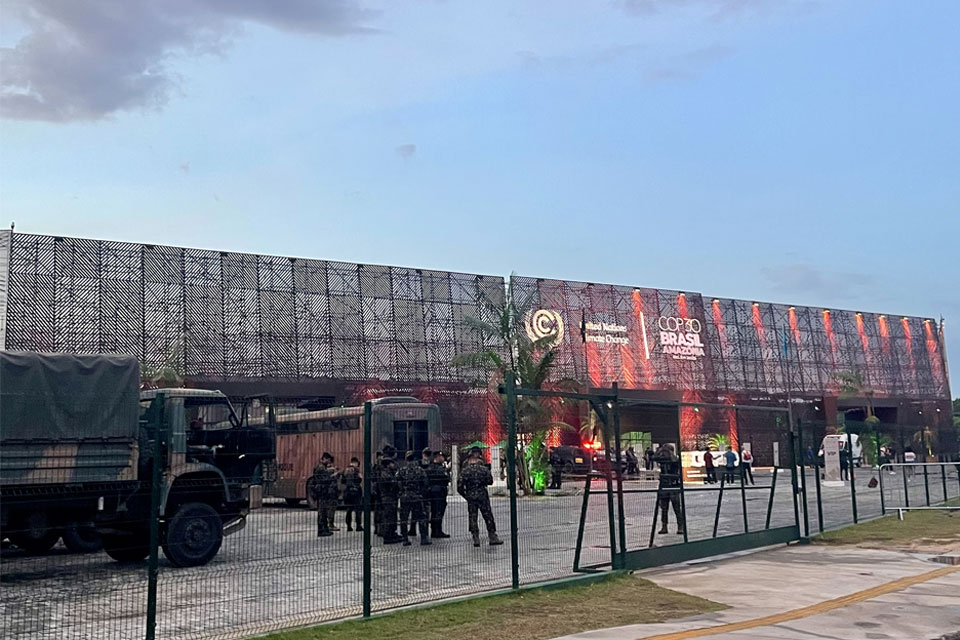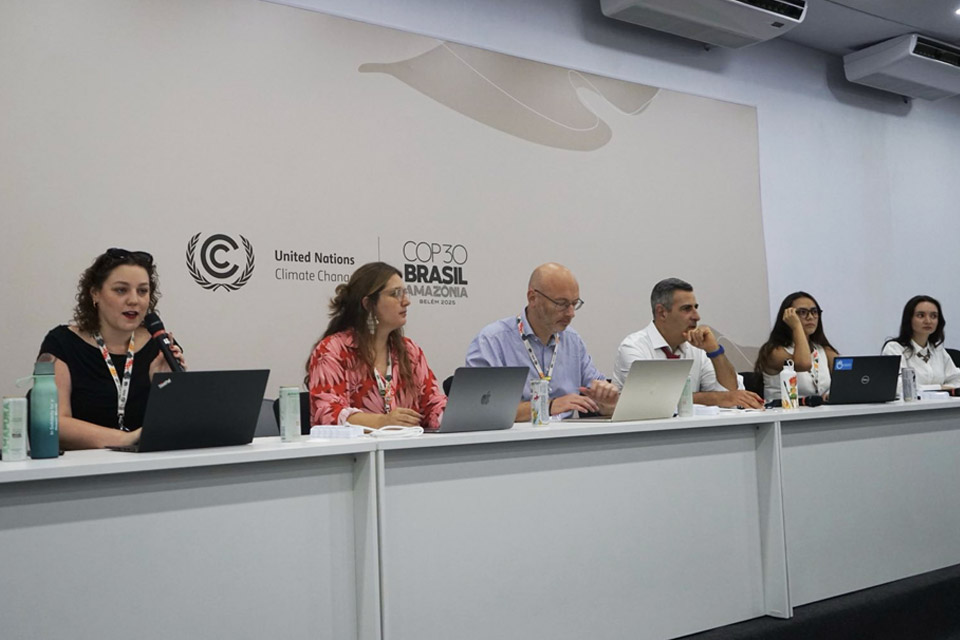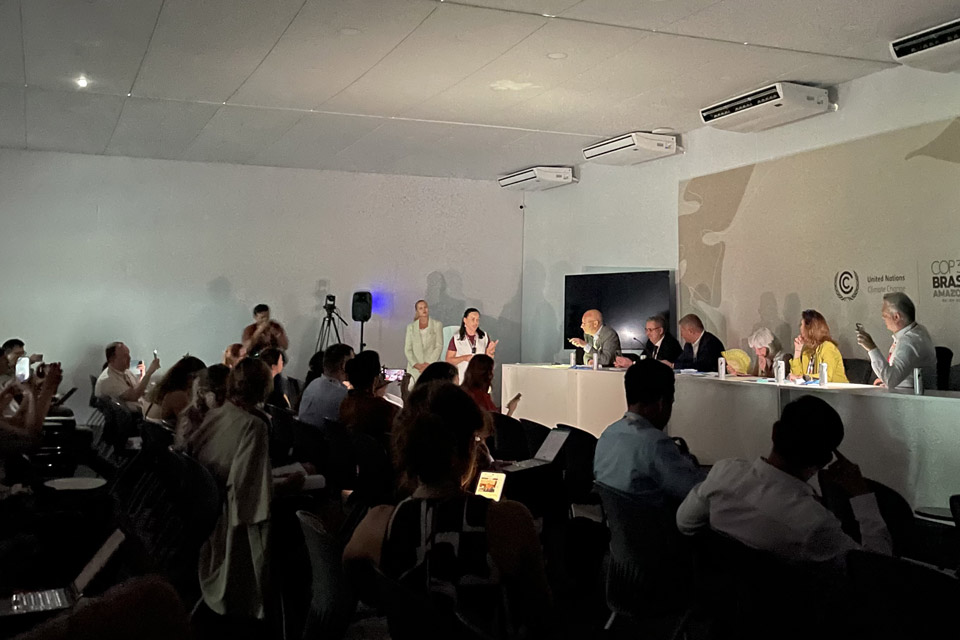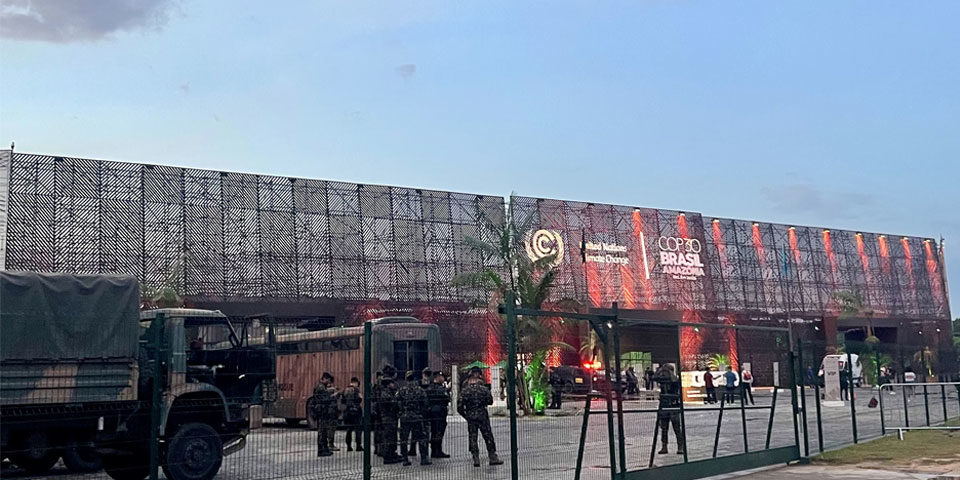The UNFCCC’s failure to address military or conflict emissions speaks to the wider structural failings of the institution.

In this post Ellie Kinney reflects on COP30, what it achieved, where it failed, what comes next and on the ever growing profile of military and conflict GHG emissions.
Introduction
COP30 was marked by fire, floods and a failure to agree on a roadmap to phase out fossil fuels. While the conference saw one major win, the adoption of the Just Transition mechanism, hailed as ‘one of the strongest rights-based outcomes in the history of the UN climate negotiations’ by the Climate Action Network, other outcomes were far from the level of ambition needed at this year’s climate summit. Critically, COP30 failed to address or even acknowledge militaries as a major polluter, despite mounting calls from civil society and statements from heads of state in the opening Leaders’ Summit. This year, this omission was made even more stark by the conference’s transition into a militarised zone.
Calling out hypocrisy
In recent COPs, dialogue between the public outside the venue and the decisionmakers within it has been largely absent; the past three COPs have taken place in countries with varying degrees of authoritarianism, meaning that any protests outside of the conference’s official ‘blue zone’ would have been illegal and unsafe. With this year’s event taking place in a country with a now vibrant and active civil society, the conference saw almost daily protests outside the venue’s gates.
One notable incident made headlines, where Indigenous protestors marched past security barriers and clashed with UN police. For these protestors, COP was a symbol of hypocrisy and racism, with the International Indigenous Peoples Forum on Climate Change pointing out that: ‘Indigenous Peoples and our representative structures continue to be marginalized and denied adequate access to spaces where decisions are made about our lands, waters and territories’. Through chants and banners, the protesters called out Brazil’s recent decision to allow exploration for oil and gas in the Amazon, despite tropical forest protection being the flagship initiative of the Brazilian COP30 presidency.
Such protests are not new; civil society groups and Indigenous Peoples have been pushing back against this decision since it was announced. Earlier this year, Ilan Zugman, director of 350.org for Latin America and the Caribbean, asked: “Who is the Amazon COP for?”, ahead of a ceremony held in Belém to announce federal investments for COP30 and its legacy. “The Brazilian government needs to decide whether it will work for the survival of the planet and those most vulnerable to the climate emergency, or whether it will continue with contradictory speeches and actions”.
COP fights back
When protest hit the COP, its response was to militarise. In the days following the action, which saw around 150 people attempt to push into the venue, delegates saw increasing levels of military presence; both ends of the entrance to the venue were flooded with armed military, arriving in personnel carriers marked for COP30. When a different Indigenous Peoples group protested outside the venue, including mothers with their babies and young children, the gates were locked shut, in front of Exército Brasileiro equipped with riot shields and helmets.
To many, this seemed peculiar. Brazil is no stranger to mass demonstrations far larger than those that hit the venue; the ‘Great People’s March’ at the midpoint of negotiations brought thousands onto the streets of Belem. Personally, I had even reflected that Brazil allows far greater freedom of expression than protestors are now granted in the UK. Then, a leaked letter revealed that the push to militarise the area outside the venue came directly from Simon Steil, Executive Secretary of the UNFCCC, in an alarming move to crack down on the public’s right to challenge climate hypocrisy.
Protected polluters
Inside a venue now protected by armed military personnel, Saudi Arabia, Russia and India amongst others would block a proposed roadmap to transition away from fossil fuels. This means that once more, COP has failed to address the root cause of the climate crisis. COP28 marked the first time any COP had agreed to ‘transition away from fossil fuels’, an agreement that has not been replicated nor built on since.

While petrostates continue to disrupt progress, other large polluters were allowed to go unchecked. The UNFCCC has consistently ignored the contribution of militaries to global emissions — estimated at around 5.5% of global emissions — despite this repeatedly being the focus of numerous side events and actions by campaigners at recent COPs. CEOBS worked with colleagues from The War on Climate to prepare a COP30 briefing on the current state of play on military and conflict emissions, and likely trajectories in an increasingly insecure world. More than a hundred organisations endorsed its call for states to take action on addressing the military emissions gap.
At CEOBS’ side event in partnership with Queen Mary University of London, SIPRI, Humanity and Inclusion, and Arctic Basecamp, speakers shared how ongoing conflicts and rising military spending are driving emissions higher, with lasting environmental legacies from wars. The conversation prompted one attendee to ask a very clear question: “Why is this still not on the agenda here?”
Alternative routes to accountability
The COP process was not the only pathway towards climate accountability discussed in Belém. Ukraine made headlines after announcing a $44 billion claim against Russia for the climate damage its war has caused since 2022, the world’s first ever claim for conflict emissions. The claim will be submitted to the Council of Europe’s Register of Damage for Ukraine, for future examination by a Claims Commission for Ukraine. While the commission has yet to be established, or financed, it could prove to be an important international precedent for wartime environmental accountability, a field that would greatly benefit from more such precedents.

The panel launching the plan included Ukraine’s Deputy Minister for Economy, Environment and Agriculture, Estonia’s Minister of Energy and Environment, and representatives from the EU, European Climate Foundation, the OSCE, and the Initiative on GHG Accounting of War. Despite the event being hit by multiple power cuts, Ukrainian delegates wasted no time and continued with phone torches and without microphones, offering a small insight into life in a country whose energy infrastructure is consistently under attack.
The grassroots speak up
Outside the COP bubble, militarism and conflicts were very much on the agenda. The People’s Summit took place in the Federal University of Pará, the largest university in northern Brazil, in partnership with international and Brazilian organisations, including WWF and Freidrich Ebert Stiftung. The summit hosted events on rising military spending, created space to share experiences of the human impact of armed conflicts, and in its closing declaration proposed:
‘We demand an end to wars, we demand demilitarisation. That all financial resources allocated to wars and the war industry be redirected to the transformation of this world. That military spending be directed towards the repair and recovery of regions affected by climate disasters.’
Once more, a gilded COP, at odds with the world outside it.
Glimmers of hope?
The adoption of the Just Transition mechanism shows the power of a united civil society, and represents hard fought win by trade unions, local communities, social movements, Indigenous Peoples’ organisations, and more. But it remains just one glimmer of hope within a process that is failing to address the root causes of an urgent existential crisis for humanity. It’s no wonder that even the COP president André Corrêa do Lago backed the upcoming First International Conference on the Phase-out of Fossil Fuels, as COP increasingly looks like a space incapable of facilitating the urgent transition away from fossil fuels, nor of holding major polluters like militaries to account. Looking ahead to COP31, this situation risks worsening. It will be hosted in Turkey, a country where peaceful protesters come under attack by the state, with negotiations led by Australia, a country that has increased its fossil fuel production by 77% over the last decade.
The public is right to push back against the UNFCCC’s glacial pace of action and, when Indigenous voices are silenced while petrostates delay climate action for yet another year, to ask who this process really represents. Progress is possible within the UNFCCC but only when civil society is given a voice, and not shut down, or locked out and met with riot gear. COP cannot continue to be a space that protects petrostates and big polluters at the climate’s expense.
Ellie Kinney is CEOBS’ Senior Climate Advocacy Officer, our thanks to The War on Climate for their collaboration at COP30; Queen Mary University of London, SIPRI, Humanity and Inclusion, Ecoaction and the Initiative on the GHG Accounting of War for their important contributions to events at COP30; and to Peace Boat and the Women’s International League for Peace and Freedom for their continued civil society coordination on this topic. If you find our work useful, please consider making a donation so that we can continue it.





